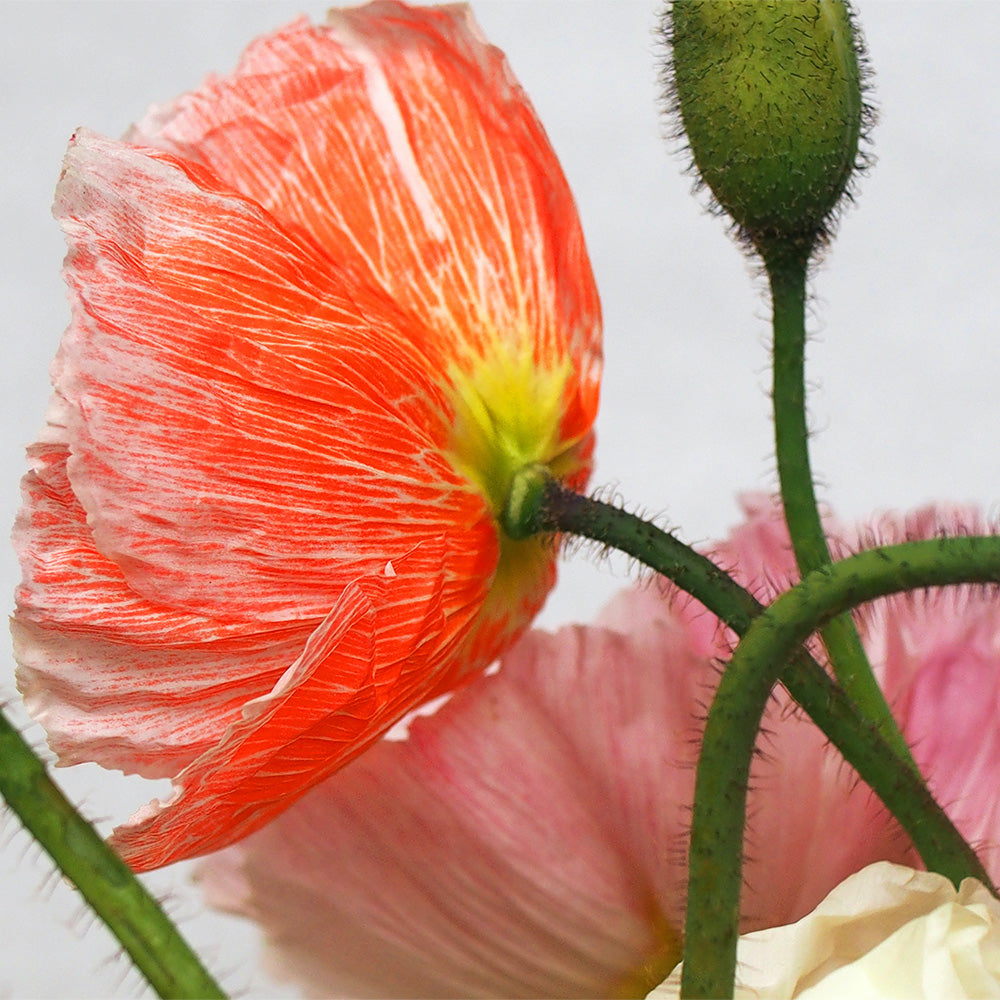
The Science Behind Adaptogenic Herbs: Hormonal Balance & Stress
Adaptogenic herbs, or simply adaptogens, are a unique class of plants that help your body "adapt" to physical, chemical, and biological stressors. They work by modulating your body's stress response systems, promoting balance and homeostasis.
Key Highlights
- Adaptogenic herbs are natural substances that can help the body manage stress and restore balance.
- Used for centuries in traditional medicine systems, adaptogens are gaining popularity in modern wellness practices.
- These powerful herbs can help regulate the body's stress response, support hormonal balance, and improve energy levels.
- Popular adaptogens include Ashwagandha, Rhodiola, and Ginseng, each offering distinct health benefits.
- It is essential to consult with a healthcare professional before incorporating adaptogens into your routine.
Introduction
In the fast-paced world we inhabit, balancing stress and hormones is not merely a luxury but a necessity for overall health, particularly for women. Adaptogenic herbs have surged in popularity as natural allies in this endeavor. These powerful plants aid in enhancing resilience to stress and supporting hormonal balance, offering a cornerstone for holistic wellness. Let’s explore.
Understanding Adaptogenic Herbs and Their Origins
Adaptogenic herbs, or "adaptogens," are plants with unique chemical properties that help the human body deal with stress. This stress can be physical, chemical, or biological. Unlike many drugs that fix specific problems, adaptogens help improve the body's overall strength and ability to cope.
Adaptogens come from traditional medicine practices in China, India, and other parts of Asia. People have used them for thousands of years. These ancient healing methods saw adaptogens as a way to boost the body's "life force" or "vital energy." This promotes well-being and can help people live longer.
Definition and Historical Use in Chinese Medicine
The word "adaptogen" was first used in 1947 by Dr. Nikolai Lazarev, a Soviet scientist, he first used this term to describe substances that can non-specifically enhance the human body's resistance to stress.
The use of these powerful herbs goes back many years. In traditional Chinese medicine, adaptogenic herbs like Panax ginseng, Rhodiola Rosea (Hong Jing Tian) and Withania somnifera (Ashwagandha) are very important for maintaining health and strength.
Traditional Chinese medicine looks at the body as a group of connected systems. It focuses on keeping balance and harmony for good health. In this way, adaptogens are thought to assist in restoring balance to the body, especially during stress or sickness.
The Role of Adaptogens in Traditional vs. Modern Medicine
Adaptogenic herbs have a long history in traditional Chinese medicine, but they are now gaining attention in modern science and healthcare. Research is finding out how these herbs work. This means they could help with many health issues.
Modern medicine values evidence-based practices. Because of this, experts are starting to see the benefits of adaptogenic herbs. Studies show that these herbs might help regulate stress hormones, support the immune system, and balance neurotransmitters.
Still, it is crucial to recognize that we need more research. We must learn about the long-term effects of adaptogenic herbs and find the best dosages for different people.

The Science of Adaptogenic Herbs
Adaptogens contain a variety of bioactive compounds, primarily complex phenolics and triterpenes/steroids, that work synergistically to produce their effects on stress response and homeostasis in the body. The specific active compounds vary between different adaptogenic herbs.
Adaptogens contain several types of active chemical compounds that contribute to their effects:
- The main chemical groups found in adaptogenic plants include:
- Tetracyclic triterpenes (similar in structure to cortisol and testosterone)
- Phenylpropanoids
- Phenylethane derivatives
- Lignans
- Phenolic compounds
- Specific examples of active compounds include:
- Ginsenosides (found in Panax ginseng)
- Eleutherosides (found in Eleutherococcus senticosus)
- Schisandrins (found in Schisandra chinensis)
- Rosavins and salidroside (found in Rhodiola rosea)
- Withanolides (found in Ashwagandha)
- Chemically, adaptogens typically contain either:
- Complex phenolics
- Tetracyclic triterpenoids/steroids
- Other active compounds found in adaptogens include:
- Alkaloids
- Terpenoids
- Flavonoids
- Coumarins
These compounds are believed to interact with the hypothalamic-pituitary-adrenal (HPA) axis and other systems involved in the stress response. The active ingredients work through multiple mechanisms to produce adaptogenic effects, rather than through a single compound or pathway
The Science of Stress and Hormonal Imbalance
Stress is a normal part of life. It can show up in many ways, from small daily problems to big life changes. Short-term stress can sometimes help us. However, chronic stress can be very harmful. It can upset the body's balance of hormones, causing different health issues.
Hormones are important chemicals that help our body work properly. They can be affected by stress. When stress lasts a long time, it can change how our body makes hormones like cortisol, known as the stress hormone. This can lead to problems like trouble sleeping, mood swings, feeling tired, and other health issues.
How Stress Affects Hormonal Balance
The body's stress response is known as the "fight-or-flight" response. This response involves the nervous system and the endocrine system. A key part of this process is the HPA axis, which stands for hypothalamic-pituitary-adrenal axis.
When we experience stress, the hypothalamus in the brain releases a hormone called corticotropin-releasing hormone (CRH). This hormone tells the pituitary gland to produce adrenocorticotropic hormone (ACTH). ACTH moves through our blood to the adrenal glands, which then release cortisol.
Cortisol is the main stress hormone. It helps us deal with stress by providing energy and reducing functions that are not essential right away. However, if stress lasts a long time, it can cause high cortisol levels. This can upset the body’s hormone balance and lead to various health issues.
The Body’s Response to Stress and the Role of Adaptogens
The body's response to stress is meant to be a short-term solution. But if you face long-term or chronic stress, this system can get overwhelmed. This can result in an imbalance called "adrenal fatigue." This is where adaptogenic herbs can help.
Adaptogens help by adjusting how the body handles stress. They help control cortisol levels and reduce the harmful effects of ongoing stress. Unlike stimulants that give a quick energy boost, adaptogens work slowly. They help your body become stronger and better at dealing with future stress.
By supporting the adrenal glands, adaptogens may help bring back hormonal balance. They can also improve energy, lift mood, and boost your body's overall ability to handle tough situations.
Key Adaptogenic Herbs for Hormonal Balance and Stress Relief
Several adaptogenic herbs have gained attention for their ability to help with hormonal balance and reduce stress. Each herb has its own special effects and advantages that suit different needs.
For example, Ashwagandha is famous for its calming effects. On the other hand, Panax ginseng is known for its uplifting energy. By looking into adaptogenic herbs, you can find natural ways to support your wellness journey.
Ginseng: The All-Rounder for Energy and Vitality
Panax ginseng, known as "true ginseng" or Asian ginseng, is one of the most researched adaptogenic herbs. It has been valued for hundreds of years in Traditional Chinese Medicine. People use Panax ginseng to increase energy, improve thinking, and help with immune function.
Research shows that Panax ginseng has special substances called ginsenosides. These ginsenosides are believed to give it many health benefits. They may work with different systems in the body, like the HPA axis, helping us handle stress and keep hormones in balance.
By helping the body respond to stress and supporting energy levels, Panax ginseng can be very helpful for those who feel tired, stressed, or want to boost their overall well-being.
Ashwagandha: For Stress Reduction and Sleep Improvement
Ashwagandha, which is scientifically called Withania somnifera, is a strong herb used in Ayurvedic medicine. This amazing herb has become very popular lately because it can reduce stress and improve mood.
Studies show that Ashwagandha may help control the levels of cortisol, the hormone related to stress. By managing cortisol, it can lessen the bad effects of long-term stress. Also, Ashwagandha can help you relax and sleep better. This makes it a great help for people who have trouble sleeping due to stress.
By calming the nervous system, lowering stress hormones, and enhancing sleep, Ashwagandha plays a key role in balancing hormones and boosting overall health.
Rhodiola Rosea: Enhancing Mood and Fighting Fatigue
Rhodiola rosea grows in the cold, mountain areas of Europe and Asia. People have used this herb for a long time to fight tiredness and improve mental clarity. It is thought to help the adrenal glands, which make our stress hormones.
Research shows that Rhodiola rosea may boost mood, lower fatigue, and improve cognitive function, especially during stress or mental tiredness. This herb can help reduce tiredness, lift mood, and sharpen focus.
Maitake Mushrooms (Grifola frondosa)
Maitake, meaning "dancing mushroom" in Japanese, earned its name from the joyful reaction of those who found it in the wild. This adaptogenic mushroom contains beta-glucans and other bioactive compounds that contribute to its health benefits. Maitake may improve insulin sensitivity and glucose metabolism, enhance immune function, and help the body adapt to and recover from stressful situations. Its potential to support hormonal balance and overall health makes it a valuable addition to adaptogenic regimens.
Reishi Mushrooms (Ganoderma lucidum): Adapting to and Managing Stress
Reishi mushrooms are renowned adaptogens, containing over 400 active compounds that help the body manage stress. They interact with the HPA axis, enhancing stress resilience and overall well-being. Studies suggest reishi may reduce anxiety, depression, and improve sleep quality. These fungi also boost immune function, a common trait among adaptogens. With a rich history in Eastern medicine for promoting longevity, reishi continues to be valued for supporting wellness and resilience against modern stressors. However, as with any supplement, it's wise to consult a healthcare provider before use.
Incorporating Adaptogenic Herbs into Your Wellness Routine
Integrating adaptogenic herbs into your life can really help your body handle stress and keep your hormones balanced. These strong herbs come in different forms, giving you many ways to enjoy their benefits.
You can add adaptogenic powders to smoothies or drinks. You can also sip on a calming cup of tea made with these herbs. They are available as capsules, powders, extracts, and teas. This makes it easier for you to experience what these adaptogenic herbs can do.
Recommended Dosages and Forms of Consumption
When adding adaptogenic herbs to your wellness routine, it's important to start with a low dose. You can then slowly increase it as needed. You should also choose high-quality herbal supplements from trusted sources. This helps make sure the herbs are strong and pure.
Here are some general guidelines for how to take them and their dosages:
- Capsules/Tablets: These are easy to take. They usually contain a standard amount of the herb. Follow what the maker says as the dosage, which is often between 250mg and 500mg a day.
- Powders: You can mix adaptogenic powders into smoothies, drinks, or meals. Start with a small dose, like 1/2 teaspoon, and then raise it slowly, depending on how strong the herb is.
- Teas: Adaptogenic teas are a nice way to enjoy the benefits of these herbs. Steep the recommended amount of the herb in hot water for 5-10 minutes. You can drink 1-3 cups a day.
- Gummies: Adaptogenic gummies have become increasingly popular as a convenient way to consume adaptogens. They are often infused with multiple adaptogenic herbs.
Keep in mind that people can respond differently to adaptogens. It might take a few weeks to feel their full effects.
Synergistic Effects with Other Herbs and Nutrients
The world of adaptogenic herbs is interesting. When you combine certain herbs or nutrients, their benefits can grow stronger. Many traditional medicine systems use herbal mixes to create remedies that help different parts of our health.
For example, mixing Ashwagandha with Rhodiola Rosea may boost their ability to reduce stress and increase energy during tough times. Similarly, taking adaptogens with other nutrients, like B vitamins or magnesium, can improve their support for stress and overall health.
Looking into how adaptogenic herbs work together can help you find wellness solutions that fit your needs. Still, it's important to talk to a healthcare professional before trying herbal mixes, especially if you have health issues or take medication.
Potential Side Effects and Considerations
Adaptogenic herbs are usually safe for most people. However, they can still cause side effects. It is important to know how these herbs may affect you. You should think about how they interact with any medicines you take and if they are suitable for you.
Before adding adaptogens to your daily routine, it is smart to talk to a healthcare provider who understands herbal medicine. This will help make sure the adaptogenic herbs you choose are right for your health.
Understanding Individual Sensitivities and Allergies
Adaptogens are usually safe for most people, but remember that everyone’s body is different. What helps one person might cause minor side effects in another. Some common side effects of adaptogens include stomach issues, headaches, trouble sleeping, and changes in blood pressure.
If you feel any bad reactions, stop using them and talk to your healthcare provider. It's a good idea to start with a small amount and see how your body reacts before you slowly take more.
Additionally, if you have allergies to certain plants, be careful when trying new adaptogens.
Interaction With Medications and Contraindications
Certain adaptogens may change how medications work. They can affect how the body absorbs, processes, or uses them.
Here’s a table showing some possible interactions:
| Adaptogen | Potential Interaction |
|---|---|
| Ashwagandha | Sedatives, Thyroid Medications |
| Rhodiola | Stimulants, Antidepressants |
| Ginseng | Blood Thinners, Immunosuppressants |
Pregnant or breastfeeding women, people with autoimmune diseases, or anyone with hormone-sensitive conditions should be careful. It's best to get professional advice before using adaptogens.
What’s Next?
While adaptogens offer impressive benefits, it's essential to remember that they're not a magic bullet. They work best as part of a holistic approach to health that includes:
- A balanced, nutrient-rich diet
- Regular exercise
- Adequate sleep
- Stress management techniques like meditation or acupuncture
Always consult with a qualified healthcare practitioner before adding adaptogens to your routine, especially if you're pregnant, nursing, or taking medications.
Frequently Asked Questions
How long does it take to notice the effects of adaptogenic herbs?
The time it takes to feel the effects of adaptogenic herbs can be different for each person. It also depends on the type of herb and how much stress you have. Some people might notice small changes in just a few days or weeks. Others might need to use the herbs regularly for a longer time to see the bigger benefits.
Can adaptogenic herbs replace conventional medicine for hormonal imbalances?
Adaptogenic herbs are not meant to replace regular medicine or be the only treatment for hormone issues. It is very important to talk to a qualified healthcare provider for diagnosing and treating any health problems. Adaptogens can help support your overall health, but they should not take the place of essential medical care.













